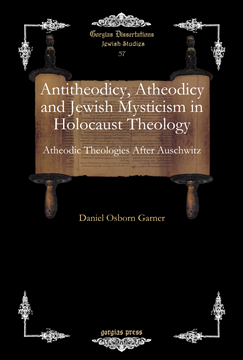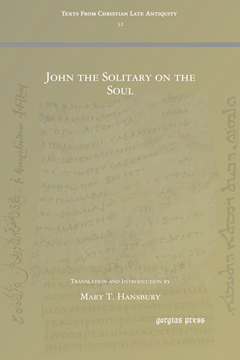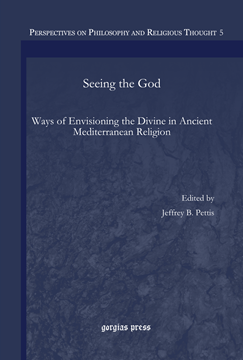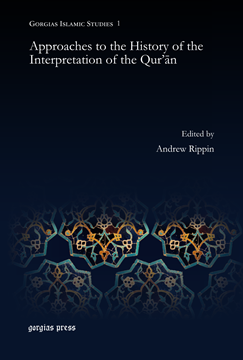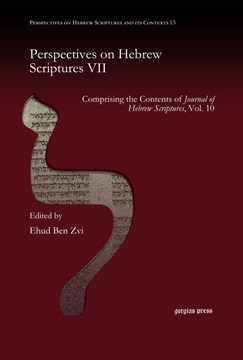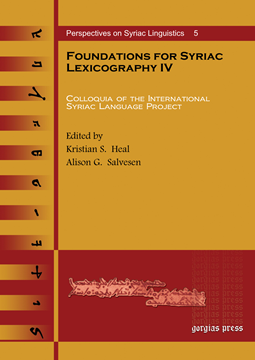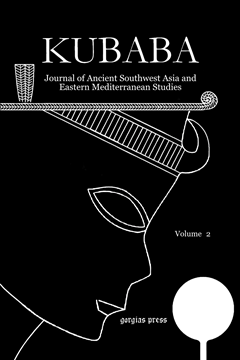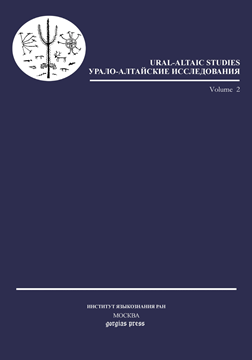Antitheodicy, Atheodicy and Jewish Mysticism in Holocaust Theology
Atheodic Theologies After Auschwitz
Series: Gorgias Studies in Judaism 57
ISBN: 978-1-4632-0176-0
The Holocaust has provoked many different Jewish theological responses, yet upon closer inspection interesting commonalities can be observed between even seemingly antithetical thinkers. One of these common trends within Holocaust theology has been the rejection and replacement of traditional theodicies which explain and justify suffering, with responses centred on ideas of recovery, consolation and divine mystery. Another widespread, though largely unrecognized trend is use of Jewish mystical themes by Holocaust theologians. This study shows how the presence of Jewish mysticism can be explained, at least in part, by this post-Holocaust collapse of theodicy.
$181.00 (USD) $108.60 (USD)
John the Solitary on the Soul
Translation and Introduction by Mary T. Hansbury
Series: Texts from Christian Late Antiquity 32
ISBN: 978-1-60724-044-0
In this treatise, John the Solitary (ca. 390) enters into a dialogue with two disciples who have come past the beginning stage of the spiritual life and have brought him their struggle against the passions in the life of the inner person (barnâšâ gawwâyâ). John’s description of the life of the soul is outlined here in a framework of the stages of the spiritual life. Included is his analysis of the passions, showing very little if any Evagrian influence. The Dialogue on the Soul is a difficult text. It is hoped that this Syriac-English presentation will enable others to take the discussion forward. John’s genial thought merits this.
$61.00 (USD) $36.60 (USD)
Seeing the God
Ways of Envisioning the Divine in Ancient Mediterranean Religion
Edited by Jeffrey B. Pettis
ISBN: 978-1-61143-251-0
"When people prayed, they expected their gods to come," wrote Robin Lane Fox, providing the impetus for this volume of collected essays exploring the concept of how the ancients “envisioned” the deities within various ancient religious traditions. The perspectives of Judaism, Gnosticism, Syriac Christianity, Byzantium, and Classical Greco-Roman religion and philosophy are considered. Specific emphasis is given to phenomena such as dreams, visions, and initiatory rites mediating the divine encounter.
$143.00 (USD) $85.80 (USD)
Approaches to the History of the Interpretation of the Qur’ān
Edited by Andrew Rippin
Series: Gorgias Islamic Studies 1
ISBN: 978-1-60724-046-4
In recent years, the Qur’ān has come to the forefront of scholarly investigations in Islamic studies. However, the traditional interpretation of the book, commonly termed tafsīr, remains a vast, virtually untapped field of investigation. Many Muslims tend to ignore the material, seeing it as a storehouse of traditional restraints, and scholars frequently gloss over its importance as a historical record of the Muslim community, not appreciating the depth and breadth of the literature. The essays gathered here expose and explore various aspects of the field of tafsīr, and their potential for scholarly research.
$169.00 (USD) $101.40 (USD)
Perspectives on Hebrew Scriptures VII
Comprising the Contents of Journal of Hebrew Scriptures, Vol. 10
Edited by Ehud Ben Zvi
ISBN: 978-1-4632-0165-4
This volume incorporates all the articles and reviews published in Volume 10 (2010) of the Journal of Hebrew Scriptures.
$298.00 (USD) $178.80 (USD)
Foundations for Syriac Lexicography IV
Colloquia of the International Syriac Language Project
Edited by Kristian S. Heal & Alison G. Salvesen
Series: Perspectives on Syriac Linguistics 5
ISBN: 978-1-61143-933-5
The fourth published colloquia of the International Syriac Language Project (ISLP), presenting papers from an international team of authors working to develop contemporary, interdisciplinary approaches to linguistics and lexicography.
$150.00 (USD) $90.00 (USD)
Foundations for Syriac Lexicography V
Colloquia of the International Syriac Language Project
Edited by Jonathan Loopstra & Michael Sokoloff
Series: Perspectives on Syriac Linguistics 7
ISBN: 978-1-61719-027-8
The fifth published colloquia of the International Syriac Language Project (ISLP), presenting papers from an international team of authors working to develop contemporary, interdisciplinary approaches to linguistics and lexicography.
$165.00 (USD) $99.00 (USD)
Kubaba 2 (2011)
Journal of Ancient Southwest Asia and Eastern Mediterranean Studies
Series: Kubaba 2
ISBN: 978-1-60724-679-4
Kubaba is a peer-reviewed journal which specializes in the geographical region of Southwest Asia, the Eastern Mediterranean, and the Aegean before the Classical Era. It publishes articles, notes, news and reviews.
$60.00 (USD) $36.00 (USD)
Ural Altaic Studies 2 (5) 2011
Series: Ural-Altaic Studies 5
ISBN: 978-1-4632-0168-5
The journal "Ural-Altaic studies" is concerned with linguistic matters, connected with the Uralic and Altaic languages. It is bilingual; all papers are published in both Russian and English.
$64.00 (USD) $38.40 (USD)
Critical Reviews in the History of Science (Volume 7)
Edited by Alan C. Bowen & Tracey E. Rihll
Series: Aestimatio 7
ISBN: 978-1-4632-0175-3
Aestimatio provides critical, timely assessments of books published in the history of what was called science from antiquity to the early modern period in cultures ranging from Spain to India, and from Africa to northern Europe. The aim is to allow reviewers the opportunity to engage critically both the results of research in the history of science and how these results are obtained.
$182.00 (USD) $109.20 (USD)
